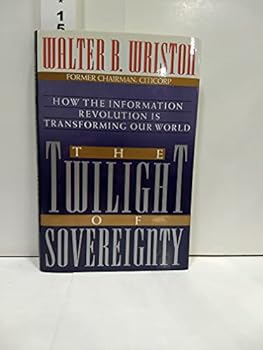The Twilight of Sovereignty: How the Information Revolution is Transforming Our World
Select Format
Select Condition 
Book Overview
Walter Wriston addresses the issues facing the corporations of America and the world during the 1990s and beyond. He argues that centralized corporate/political power has disappeared; that the world has been transformed by technology; and that negotiation will rule the world in future.
Format:Hardcover
Language:English
ISBN:0684194546
ISBN13:9780684194547
Release Date:January 1992
Publisher:Scribner Book Company
Length:192 Pages
Weight:1.00 lbs.
Dimensions:0.9" x 6.4" x 9.6"
Customer Reviews
2 ratings
Prescient
Published by Thriftbooks.com User , 19 years ago
In "The Twilight Of Sovereignty", the late Walter Wriston, former Chairman of Citicorp spoke to the positive transformative effects of information technology and the subsequent rise of transparency and democracy through globalization. Although this book was written in 1992, just after the collapse of the Soviet Union, his commentary about the spread of modern communications and how better communications will enable the forces of globalism to erode the power of local tyrannies, empower individuals and promote democracy was prescient. His comments predate those of Walter Russell Mead in "Power Terror War And Peace" by several years, but are clearly in agreement. In `Twilight" Wriston's view that the so-called managerial class has outlived its usefulness as a communications hierarchy and is now superfluous or even destructive to operational efficiency is a clear example of what Mead calls the Millennial Capitalist replacement of the Fordist managerial state. Wriston also set the stage for Thomas Barnett's call for transparency and globalism as a means to fight terrorism in Barnett's recent book, "The Pentagon's New Map". In Wriston's view "the law of technology is the law of convergence" and "as information technology brings the news of how others live, the pressure for freedom will be irresistible". This is a more eloquent if a less detailed discussion than Barnett's chapter entitled `Mind the Gap', but the train of thought is essentially the same. This book is more a survey than the intensive development of the ideas that Wriston proposed, but it may be that he just assumed a degree of literacy that is no longer general. His historical references include Max Weber, whose theory of state has sovereignty emerging from the exclusive use of legitimate violence, and Frederick Hayek, whose individual choice based market solutions establish him as the intellectual heir of Adam Smith. Wriston also included modern commentators like Carver Mead and George Gilder who rejoice in the ever- accelerating pace of technological change. Wriston said that change is a constant in the global marketplace and that "change is what Americans deal with best." Although somewhat dated, I recommend this book as a concise general preview of the technological globalist argument from one of its original proponents.
Most alarming book since Orwell's 1984
Published by Thriftbooks.com User , 27 years ago
Walter Wriston emvisions a world where corporations exercise totalitarian control. With control of financial markets, they are able to make or break nations who stand in the way of their eternal drive for greater and greater profits. Mr. Wriston asks us to trust that the corporations' managers are now more enlightened while he acknowledges that they have a brutal history. This book should be a wake up call to any one who is not a member of the stock-holding privileged class that our future lies in sweatshops unless we act now to stop the multi-national corporations.






